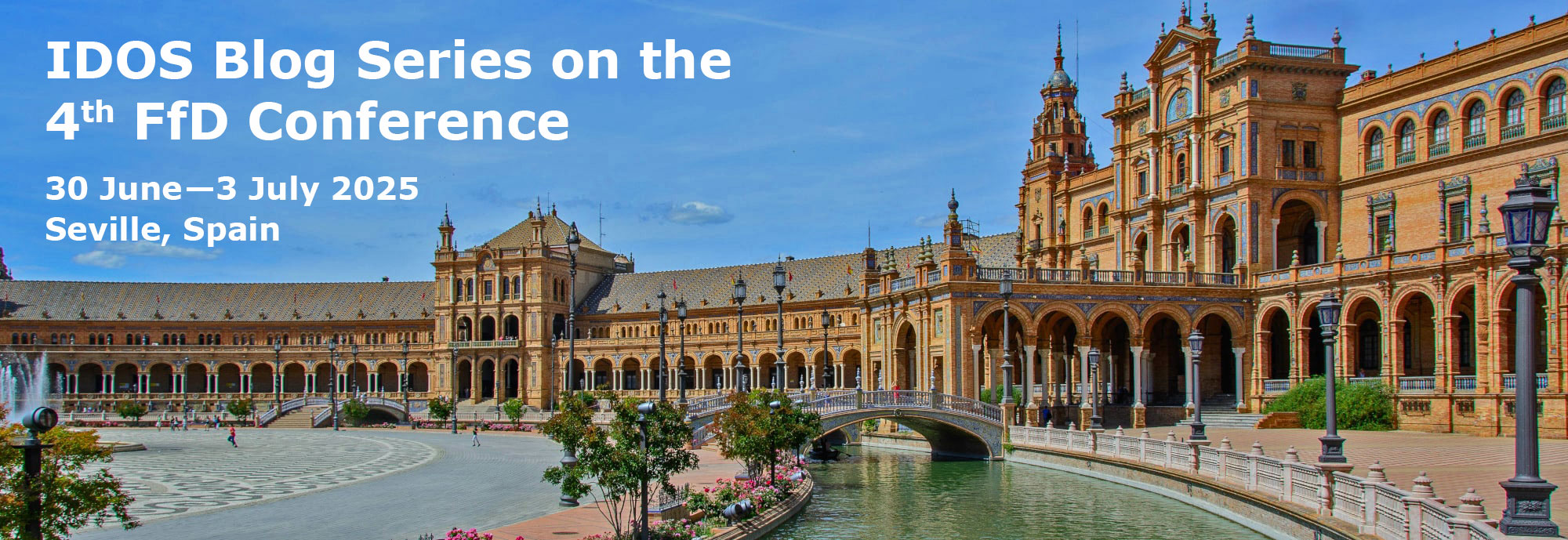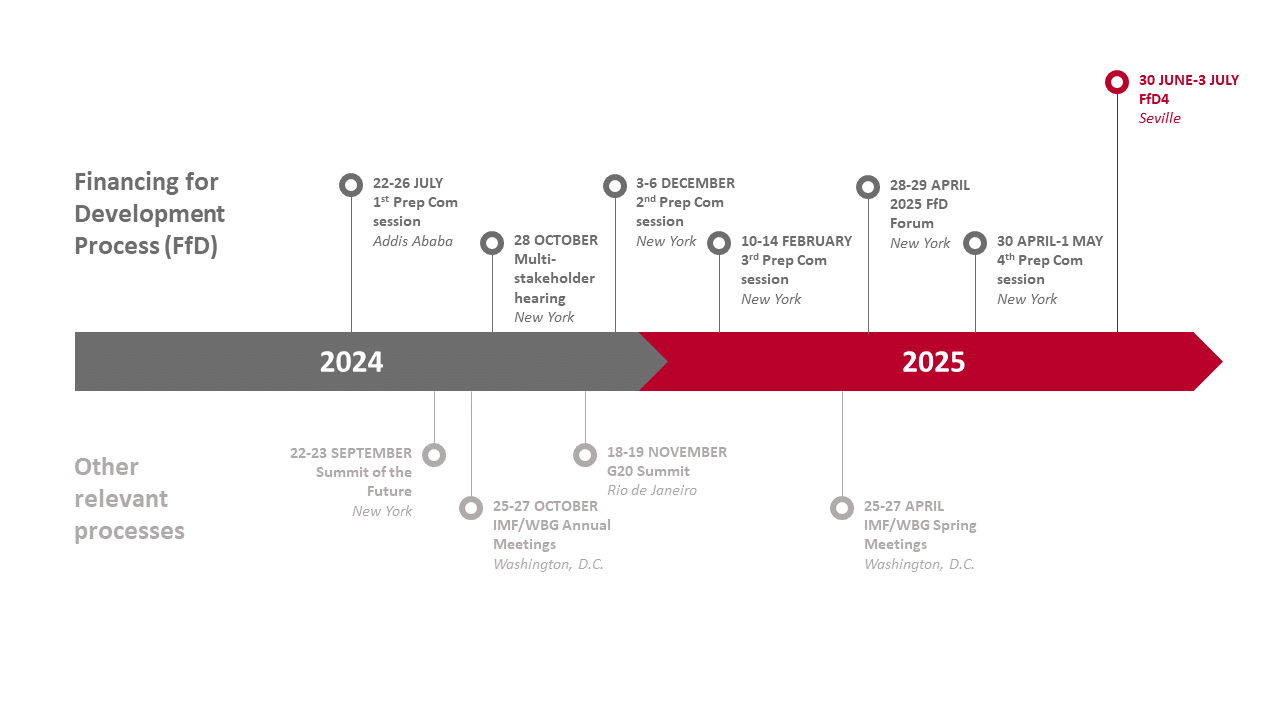IDOS Blog Series on the 4th FfD Conference
The 4th International Conference on Financing for Development (FfD4), scheduled for June 30 to July 3 in Seville, Spain, will conclude an extensive United Nations process that aims to align public and private financial flows with social, environmental, and economic goals. At the conference, governments are expected to agree on an outcome document that succeeds the Addis Ababa Action Agenda, adopted at the 3rd FfD conference in 2015. This post launches an IDOS blog series accompanying the FfD4 process. The series will explore key issues discussed in the process, such as taxation, international development cooperation, international trade, and sustainability in financial markets, and offer actionable policy recommendations.
Development Finance in Crisis
The policy questions addressed in the FfD process are more urgent than ever. Many countries of the Global South are heavily indebted, which limits their financial capacity to implement the SDGs and transition to environmentally sustainable economies. Illicit financial flows and tax evasion further erode the tax revenue base of developing countries. In addition, current investment patterns remain misaligned with sustainability objectives: A great amount of capital continues to flow into carbon-intensive industries while funding for the socio-ecological transformation is inadequate. The longstanding pledge to allocate 0.7% of GNI to Official Development Assistance (ODA) remains unmet by most DAC members, and some donor nations have even reduced funding for development cooperation and humanitarian aid in recent years. Countries of the Global South also remain highly underrepresented in international economic and financial institutions. Furthermore, international climate finance is nowhere near where it needs to be and last year’s negotiations on a new collective quantified goal (NCQG) yielded underwhelming results. Most of these interconnected challenges have cross-border implications and demand coordinated action. It is thus crucial to make progress regarding a common understanding of governments on the policy measures necessary to address them.
Purpose and Challenges of the FfD process
Achieving a meaningful international agreement that goes beyond abstract statements already affirmed in previous documents is cumbersome – not least in the current international political situation marked by conflicts and divides. Broader geopolitical tensions—such as those between NATO and Russia, or between China and the US—influence the FfD negotiations. Divides are also visible regarding specific topics discussed in the process. For instance, in the negotiations, many donor countries advocate for greater use of blended finance instruments, while Global South countries often highlight the risks and weak track record of these tools.
Disagreement exists even with respect to the scope of the FfD process. For example, the US frequently pushes for a narrow mandate, favouring FfD4 to refrain from making significant decisions on topics such as international tax cooperation, the reform of the International Financial Institutions (IFIs), and issues related to international trade. Instead, the US prefers to address these topics in other fora and institutions, such as the OECD, the governance bodies of the IFIs, or the World Trade Organisation (WTO). In contrast, the G77, a coalition of countries of the Global South, wants to make use of the opportunity to influence policies in these areas through the FfD process, in which all its member can raise their voice. In this respect, FfD differs from exclusive fora, such as the G20, or institutions like the World Bank or the IMF, where voting rights are heavily weighted. The G77 thereby points to the main advantage of the FfD process, which offers a unique opportunity for many stakeholders to influence decision-making on the governance of issues that strongly affect them; stakeholders, who may have interests and perspectives that differ from those commonly represented in global governance. In addition, as a UN process, it is less susceptible to deficiencies that are associated with the informal nature of institutions, such as the G20 (e.g. with respect to transparency and accountability).
Even if decisions on concrete policy measures will probably be rare, the process has the potential to influence the agenda of international politics and shape the narratives guiding the activities of national governments and international organisations. In this respect, the process should in particular be used to foster a global narrative that sees the financing of sustainable futures as a shared responsibility and opportunity. Moreover, FfD4 can help to mobilise the political will to push forward and provide new perspectives to reform processes that mainly take place in other fora, such as the G20 and the Annual and Spring Meetings of the IMF and the World Bank, including in the areas of international tax cooperation, the reform of multilateral development banks and the resolution of pressing debt crises.
The Road to Seville
To make FfD4 a success, the preparatory process leading to the conference is crucial. Four sessions of a preparatory committee between July 2024 and May 2025 precede the conference. In addition, a multistakeholder hearing in New York in October 2024 offered representatives of civil society, private sector, and international organisations the opportunity to voice their demands for the process.Many stakeholders (including IDOS) also provided inputs for an Elements Paper prepared as first basis for the outcome document. A zero draft of the FfD4 outcome document building on the Elements Paper, the discussions at the first two preparatory conferences and the multistakeholder hearing at the UN is supposed to be published soon.
In light of the challenges mentioned above, it will be crucial for the upcoming negotiations that governments achieve an ambitious agreement that stakes out a way out of the current crisis of development finance. Besides the often tiresome negotiations on specific formulations in the outcome document, the impact of the many opportunities for dialogue within the formal process but also on side events, in blog posts and policy papers should not be underestimated. FfD4 should strengthen actors who believe in international cooperation and resist the current trend towards nationalist policies, and provide them with spaces to exchange and built alliances. With this blog series, IDOS contributes to the exchange between different stakeholders that the FfD process facilitates.
All blogs express the views of the author(s).



Schreibe einen Kommentar